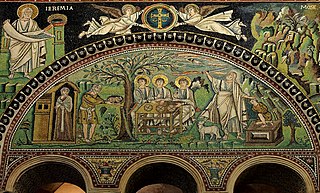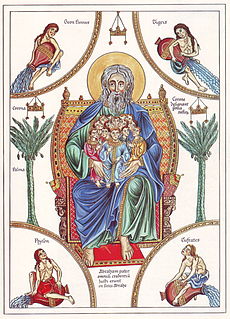Genesis 1 typically refers to the first chapter of the Biblical book of Genesis.

The Genesis creation narrative is the creation myth of both Judaism and Christianity. The narrative is made up of two stories, roughly equivalent to the first two chapters of the Book of Genesis. In the first, Elohim creates the heavens and the Earth in six days, then rests on, blesses and sanctifies the seventh. In the second story, God, now referred to by the personal name Yahweh, creates Adam, the first man, from dust and places him in the Garden of Eden, where he is given dominion over the animals. Eve, the first woman, is created from Adam and as his companion.

The Bible is a collection of sacred texts or scriptures. Varying parts of the Bible are considered to be a product of divine inspiration and a record of the relationship between God and humans by Christians, Jews, Samaritans, and Rastafarians.

Different religious groups include different books in their biblical canons, in varying orders, and sometimes divide or combine books. The Jewish Tanakh contains 24 books divided into three parts: the five books of the Torah (‘teaching’); the eight books of the Nevi'im (’prophets’); and the eleven books of Ketuvim (’writings’). It is composed mainly in Biblical Hebrew, and its Masoretic Text is the main textual source for the Christian Greek Old Testament.
It may also refer to:
- Genesis I, an experimental spacecraft launched by Bigelow Aerospace in 2006
- LAK Genesis — a tailless glider developed by Jim Marske and John Roncz in the United States.

Genesis I is an experimental space habitat designed and built by the private American firm Bigelow Aerospace and launched in 2006. It was the first module to be sent into orbit by the company, and tested various systems, materials and techniques related to determining the viability of long-term inflatable space structures through 2008. Such structures, including this module and others built by Bigelow Aerospace, were similar to the 1990s NASA expandable TransHab design, which aimed to provide increased interior volume at a reduced launch diameter and potentially reduced mass compared to traditional rigid structures.

The Genesis 2 is a Standard Class competition glider that was designed by an American team led by Jerry Mercer. It was produced in Lithuania. It is notable in having almost no rear fuselage. However it is not tailless, because it has a small, all-moving tailplane on top of the vertical stabilizer. The tailplane is mainly a trimmer, rather than for longitudinal stability.

The United States of America (USA), commonly known as the United States or America, is a country composed of 50 states, a federal district, five major self-governing territories, and various possessions. At 3.8 million square miles, the United States is the world's third or fourth largest country by total area and is slightly smaller than the entire continent of Europe's 3.9 million square miles. With a population of over 327 million people, the U.S. is the third most populous country. The capital is Washington, D.C., and the largest city by population is New York City. Forty-eight states and the capital's federal district are contiguous in North America between Canada and Mexico. The State of Alaska is in the northwest corner of North America, bordered by Canada to the east and across the Bering Strait from Russia to the west. The State of Hawaii is an archipelago in the mid-Pacific Ocean. The U.S. territories are scattered about the Pacific Ocean and the Caribbean Sea, stretching across nine official time zones. The extremely diverse geography, climate, and wildlife of the United States make it one of the world's 17 megadiverse countries.
| This disambiguation page lists articles associated with the title Genesis 1. If an internal link led you here, you may wish to change the link to point directly to the intended article. |

















